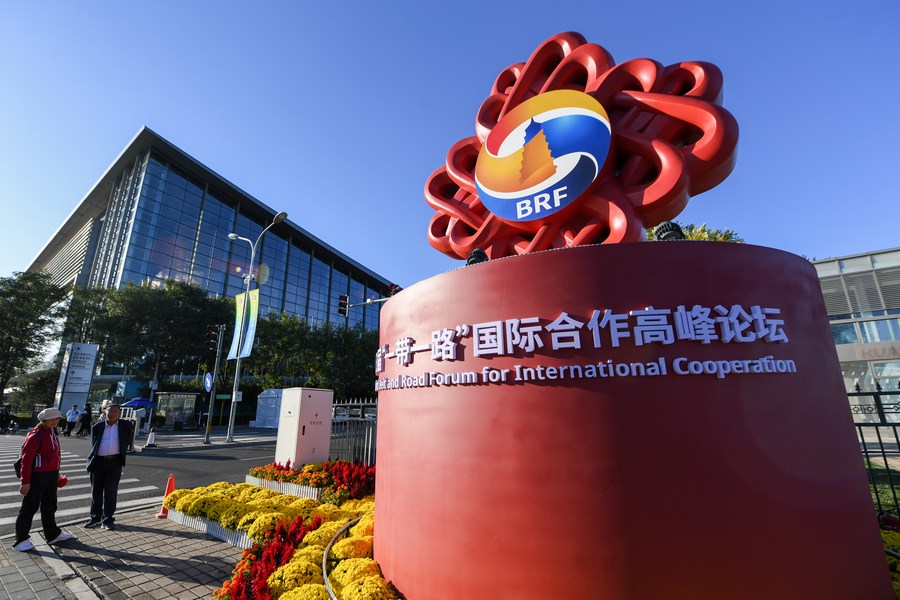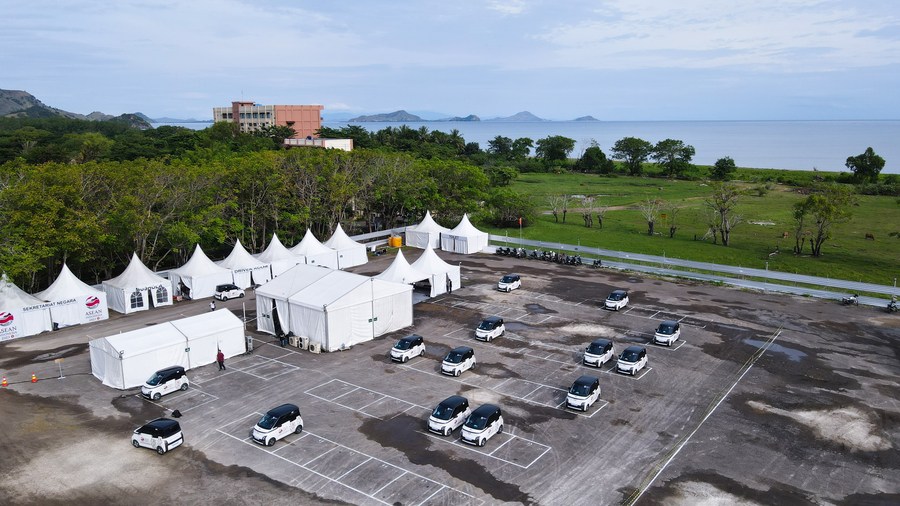(BRF2023) Guest Opinion: Decade-old BRI will boost greener globalization

This photo taken on Oct. 14, 2023 shows a floral decoration for the third Belt and Road Forum for International Cooperation (BRF) near China National Convention Center in Beijing, capital of China. (Xinhua/Ju Huanzong)
The decade-old Belt and Road Initiative (BRI) has cemented China's reputation as a global public good power for a more inclusive, equitable and especially sustainable globalization in an age of climate change, as well as environmental and energy crises worldwide.
by Wang Huiyao
With more than 4,000 delegates from over 140 countries and 30-plus international organizations attending the third Belt and Road Forum for International Cooperation (BRF) in Beijing, the decade-old Belt and Road Initiative (BRI) has cemented China's reputation as a global public good power for a more inclusive, equitable and especially sustainable globalization in an age of climate change, as well as environmental and energy crises worldwide.
Vetted data and news reports have vindicated a rising China's green infrastructure projects. From hydrogen refueling stations and pipelines to the cutting-edge technology of carbon capture, utilization and storage, from Chinese lithium battery plants in Central Asia to wind turbines scattered over the ancient Maritime Silk Road, let alone the country's strength in photovoltaic modules manufacturing and competitive prices over counterparts, all testify China's efforts to pursue a vision of sustainable development.
As a global leader in clean energy technologies, China is keen to deploy and invest in renewable power. China has the world's largest installed capacity of hydropower, photovoltaic power and wind power.
Moving from power to transport, it is expected that electric vehicles (EVs) will dominate the global auto market by the early 2040s. The rise of EVs will have a major impact on the auto industry. China continues to be the largest EV market, with over 5 million vehicles sold in 2022.

This aerial photo taken on May 9, 2023 shows Wuling Air electric vehicles at the camp of Wuling Motors Indonesia for the 42nd ASEAN Summit in Labuan Bajo, East Nusa Tenggara province, Indonesia. (Xinhua/Xu Qin)
In addition to energy production and consumption, green development will also reshape the way we handle products across their entire life cycle, from design and production to use and end-of-life disposal or recycling. Transforming this whole process requires new business models and forms of collaboration across the industry.
Expanding the target sectors and regions of the Asian Infrastructure Investment Bank (AIIB) would be a plausible way to provide support for eligible infrastructure investment projects worldwide.
China could explore the possibility of building an international development bank cooperation alliance to boost collaboration among multilateral development banks.
Erik Berglof, chief economist of the AIIB, warned of the rising debt levels in the countries that are most vulnerable to the effects of climate change.
The alliance between international development banks such as the World Bank, the African Development Bank, the European Bank for Reconstruction and Development, the Islamic Development Bank and the AIIB is to bolster inter-banking coordination to improve and renovate traditional infrastructure in developing countries, build digital infrastructure and enable the green transitions to a goal of carbon neutrality and offering potential areas of cooperation.
While there are funding gaps, infrastructure spending tends to spur investment demand and boost job opportunities. So long as the global geopolitical environment allows, the arrangement could form an international, standardized, open and transparent infrastructure development system and expand supply networks for global products.
While pursuing the "dual goals" to peak its carbon dioxide emissions by 2030 and achieve carbon neutrality by 2060, China has been improving the sustainability and efficiency of the BRI, as an international public good, in line with the current trend of globalization.
Editor's note: Wang Huiyao is the founder and president of Center for China and Globalization, a think tank in China.
The views expressed in this article are those of the authors and do not necessarily reflect the positions of Xinhua News Agency.

